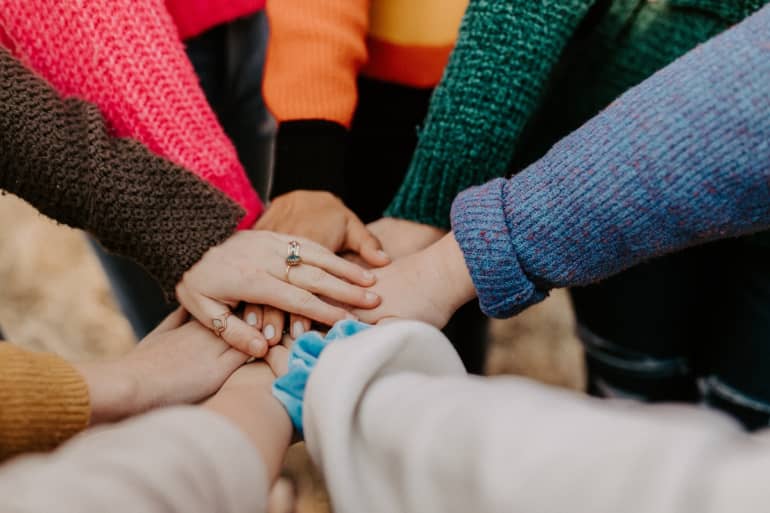Addiction recovery is a journey that does not end when a person’s time in detox or residential treatment comes to a close. Between continued outpatient care and ongoing support from friends, family, and loved ones, there is always a way to continue focusing on each person’s sober goals. While active recovery efforts are still as important as ever as an alumnus, a person’s transition out of a dedicated treatment facility and into their own daily life and routines is still difficult. Staying connected during this time and throughout each person’s continued journey as an alumnus is instrumental in continuing to further their sober goals and develop skills for a sustained, transformed life.
The Importance of Staying Connected
Interpersonal relationships are necessary throughout addiction recovery. For many, the journey with the use of drugs or alcohol is complex. Feelings of isolation and loneliness are incredibly common as those engaging with addictive substances may have shut off from previous social circles. Others may have felt misunderstood, judged, or experienced the deterioration of important relationships. Getting connected to others and maintaining this connection is crucial for maintaining effective sober practices and establishing a healthy mentality.

Sobriety and recovery are lifestyles. Those continuing on their sober journey will face many hurdles and challenges along the way, with recovery rarely being a perfectly straight and predictable journey. Staying connected is crucial for continuing to focus on each individual’s sober efforts while staving off feelings of anxiety, depression, and isolation. These connections can continue to be influential in each person’s recovery journey as they provide a sense of belonging. Additionally, social connections can also:
- Introduce individuals to new recovery techniques
- Lead individuals to adapt their personal recovery strategies
- Offer access to an educated and sympathetic outlet in sobriety
However, staying connected with peers and professionals can be difficult while also balancing the stresses throughout a person’s transition to a healthy life outside of the treatment facility. Utilizing a number of personalized strategies in tandem can ensure each individual can stay connected with those that have positively influenced their recovery. Utilizing various strategies can also help individuals better manage their relationships and create the best support for ongoing sobriety.

Our Hawaii recovery center can help you manage your sobriety and self-care outlets as an alumnus. For more information, call us today at (866) 390-5070.
More infoCreating a Community
Before employing any particular skills on how to stay connected with others, it is first important to determine with whom each person wants to stay connected. Not all people in sober life will provide the same level of support. Choosing who to trust with the complex vulnerabilities of addiction recovery can be a big decision. Families, professionals, and peers first met in residential treatment or in continued outpatient care are all great places to begin when looking for the most understanding and sympathetic support networks.
Attend Outpatient Meetings
The first step in staying connected as an alumnus involved getting out to regular meetings. Continued outpatient support is crucial for managing sobriety, even as an alumnus. Using these scheduled meetings to create a regular routine can be essential. Additionally, they also empower those in recovery to continue managing these relationships and staying connected with an educated, supportive, and open community while in pursuit of their personal sober goals.
Being physically present in these meetings also promotes the most effective communication possible, further developing these relationships and providing opportunities to further connect with others, either through exchanging personal information or developing trust in these meetings to address and overcome personal challenges throughout recovery. Feeling like an active, participating member of a community on a regular basis can promote the healthiest social interactions, social circles, and more.
Keep a Regular Communication Line
Staying connected with others doesn’t necessarily mean that an individual has to constantly be discussing and navigating specific, recovery-focused topics. Rather, keeping text chains, emails, or phone call routes with others can be more casual. The ability to discuss hobbies, share stories, and more can all be important in these relationships. However, most importantly, they also keep these lines of communication active, even when separated by physical distance in outpatient treatment. This can make outreach for answering specific questions, utilizing support, or fostering understanding much easier.
Get Involved in the Community
Community involvement can also birth new and supportive relationships as well as foster established ones. Making an effort to get involved with local programs through volunteer opportunities, engagement in local committees, or even engagement in local festivities or traditions can all be great ways to ingratiate oneself in a community. For alumni navigating their sobriety, this kind of connection to their community at large can provide a wealth of support for their developing identity in sobriety, whether or not they are discussing their journey with addiction directly.

The unique perspective of alumni can facilitate a cycle of recovery and healing. Learn to reach out to peers by calling Hawaii Island today at (866) 390-5070.
More infoStaying Connected to Hawaii Island
Hawaii Island Recovery offers a comprehensive approach to community and camaraderie through our Hawaii drug and alcohol treatment centers, even as an alumnus. Staying connected is paramount throughout any stage of recovery, and graduating from a dedicated residential program does not mean that the support available through Hawaii Island has ended. Rather, staying connected to professionals and communities established at Hawaii Island is always a phone call or visit away, creating a sustainable, consistent community where each person is welcome and accepted throughout any stage of recovery.
Staying connected to peers and professionals alike is crucial throughout your continued sober efforts. At Hawaii Island Recovery, we champion the opportunity to create a community of supportive people and an atmosphere of healing throughout each step of your sober journey, with opportunities available both while under our roof in residential treatment or as an alumnus. Our effective Hawaii drug and alcohol treatment centers and communities can create a unique approach to sobriety in your life, all while introducing you to peers and developing strategies to connect with supportive, understanding people throughout your recovery. For more information on how we can continue to support your sobriety and recovery, call to speak to us today at (866) 390-5070.
 Hawaii Island Recovery
Hawaii Island Recovery 










